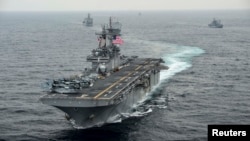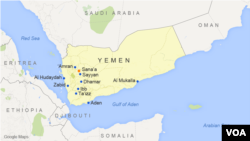U.S. military personnel are back on the ground in Yemen in an effort help drive al-Qaida in the Arabian Peninsula (AQAP) from the port city of Mukalla.
The Pentagon said the small group arrived in Yemen less than two weeks ago and is providing what is being described as limited intelligence support.
"We have seen over the period of many months a troubling growth of AQAP in Yemen,” said Pentagon spokesman Capt. Jeff Davis, calling the terror group “a significant security threat to the United States and to our regional partners.
Davis said the support included airborne surveillance and reconnaissance, assistance with operational planning and aerial refueling.
The USS Boxer Amphibious Readiness Group and the 13th Marine Expeditionary Unit have also been sent to the waters off the coast of Yemen to help provide medical help and maritime security.
Davis said the U.S. support is being given to the United Arab Emirates, which has been leading a coalition of Arab countries supporting Yemeni forces in the area.
"We welcome this effort to specifically remove AQAP from Mukalla and to degrade, disrupt and destroy AQAP in Yemen," he said.
Resuming airstrikes
The Pentagon also said the U.S. had resumed taking unilateral action against AQAP, with four airstrikes against the terror group since April 23.
The strikes killed 10 AQAP operatives and injured another, Davis said, though he added none of the operatives were considered to be high value targets.
The U.S. had maintained a troop presence in Yemen as part of a counter terrorism partnership with the Yemeni government. But the last U.S. forces were pulled out in March of last year as sectarian violence threatened to rip the country apart.
At the time, U.S. officials said the move was necessary but worried that pressure on AQAP was evaporating, and could allow the group to regain momentum.
Most dangerous al-Qaida affiliate
A U.S. intelligence official described the recent U.A.E.-Yemeni efforts to rout AQAP from the port city of Mukalla as a positive development that could help check the group’s expansion.
“The operation in Mukalla, if sustained, would deprive AQAP of an important stream of revenue and resources,” the official said. “It also removes AQAP’s base of operations and forces AQAP back into the desert, where it is more vulnerable.”
Intelligence officials have long considered AQAP as the most dangerous of the al-Qaida affiliates, with a proven capability of carrying out attacks against the U.S.
In 2010, AQAP attempted to send explosive-laden packages to the U.S. The year before, it sent Nigerian-born Umar Farouk Abdulmutallab, to detonate a bomb hidden in his underwear on a Northwest Airlines flight on Christmas (December 25).





